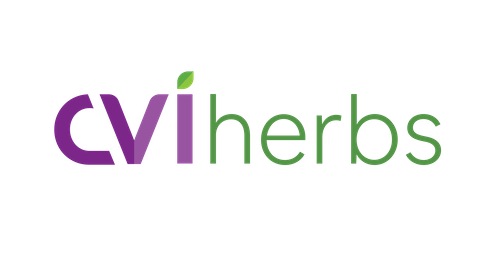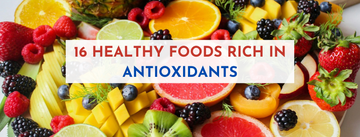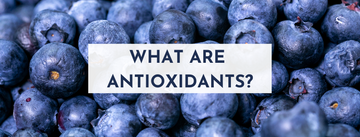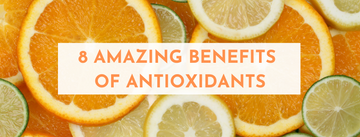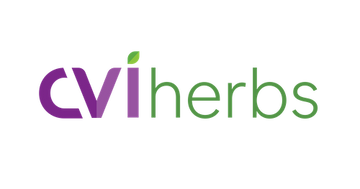Antioxidants are like bodyguards for your health. They protect your body from harmful substances called free radicals, which can cause problems like diabetes and cancer. You can find these bodyguards in lots of fruits and veggies. Two examples are Vitamin E and Vitamin C.
You might have heard about antioxidants before, but not everyone understands what they do.
This article will explain everything you need to know about antioxidants.

Source: Antioxidants exist naturally in foods but can also be synthetically produced.
What Are Antioxidants?
Antioxidants are like superheroes in your body. They battle against bad guys called free radicals, which can make you sick if there are too many of them. Free radicals are connected to diseases like diabetes, heart problems, and cancer.
Luckily, your body has its own team of antioxidants to fight off these troublemakers.
But you can also get antioxidants from your food, especially from fruits, veggies, and other natural foods. Vitamins like E and C are super good at this job.
And in the food world, antioxidants are like magical preservatives. They help keep your food fresh for longer by stopping it from spoiling too soon.
Types Of Antioxidants
There are many different types of antioxidants, possibly hundreds or even thousands. Each type plays a unique role and can work together with others to help your body function well.
"Antioxidant" isn't really the name of a specific substance, but it's a term that describes what a bunch of different substances can do.
Some examples of antioxidants that come from outside your body include:
- Vitamin A
- Vitamin C
- Vitamin E
- Beta-carotene
- Lycopene
- Lutein
- Selenium
- Manganese
- Zeaxanthin
Flavonoids, flavones, catechins, polyphenols, and phytoestrogens are all different types of antioxidants and phytonutrients. You can find them all in plant-based foods.
Each antioxidant does something unique, so you can't just swap one for another. That's why it's important to eat a variety of foods in your diet.
Benefits Of Antioxidants
Antioxidants are like bodyguards for your cells, shielding them from damage caused by harmful substances called free radicals, a process known as oxidative stress.

Source: Do you understand what antioxidants are and how they benefit your body?
Things like intense exercise, tissue injuries, certain foods (like processed ones), smoking, pollution, and exposure to chemicals can all lead to oxidative stress.
This stress can cause problems like:
- Releasing too much iron or copper into your system
- Over Activating certain white blood cells called phagocytes
- Increasing the production of free radicals by certain enzymes
- Messing up the way your cells transfer electrons
- All of this can lead to oxidative stress, which has been linked to serious issues like cancer, heart disease, and vision loss.
Antioxidants are believed to help lower these risks by neutralizing free radicals. They do this by acting as scavengers, donating hydrogen and electrons, breaking down harmful substances, and more.
Some studies suggest that antioxidant supplements could even help prevent vision loss in older adults with macular degeneration.
However, overall, there's not enough solid evidence to prove that loading up on antioxidants can prevent diseases. Some studies show no benefit or even harm, while others are inconclusive.
Food Sources Of Antioxidants
Antioxidants are like the superheroes of food, and the best places to find them are in plant-based foods, especially fruits and veggies.
Some foods are packed with antioxidants, earning them the titles of "superfoods" or "functional foods."
Here's where you can find specific antioxidants in your diet:
- Vitamin A: Dairy products, eggs, and liver
- Vitamin C: Most fruits and veggies, especially berries, oranges, and bell peppers
- Vitamin E: Nuts, seeds, vegetable oils, and leafy greens
- Beta-carotene: Colorful fruits and veggies like carrots, peas, spinach, and mangoes
- Lycopene: Pink and red fruits and veggies, such as tomatoes and watermelon
- Lutein: Leafy greens, corn, papaya, and oranges
- Selenium: Whole grains like rice and wheat, nuts, eggs, cheese, and legumes
- Curcuminoids: found in turmeric, cumin serves as an antioxidant-rich herb and also exhibits strong anti-inflammatory properties. You can find this ingredient in Cumargold.

CUMARGOLD - Specialize Support For Gastric Issues & Digestive Health
Other foods believed to be rich in antioxidants include eggplants, legumes like black beans, teas (green and black), red grapes, dark chocolate, pomegranates, and goji berries. You can find many of these, including goji berries.
Usually, foods with bright, bold colors pack the most antioxidants.
And here are a few examples of antioxidant-rich foods:
- Blueberries
- Apples
- Broccoli
- Spinach
- Lentils
Types Of Dietary Antioxidants
Here are some simple tips to boost your antioxidant intake:
- Add fruits or veggies to every meal and snack you have throughout the day.
- Drink a cup of green or matcha tea daily for its antioxidant benefits.
- Aim for a colorful plate by including vibrant foods like kale, beets, and berries.
- Spice up your meals with antioxidant-rich herbs and spices like turmeric, cumin, and ginger.
- Snack on nuts, seeds, and dried fruit, but opt for unsweetened and unsalted varieties.
Try out these healthy and tasty recipes created by dietitians:
- Cherry-almond smoothie
- Spicy cinnamon-ginger roasted carrots
- Roast beet and red quinoa salad with orange-beet balsamic vinaigrette
- Carrot cake power smoothie
- Chickpea, kale, and cashew superfood soup
- Spicy Thai lettuce wraps
- Cure-all juice
Remember, there's no specific daily recommendation for antioxidants, but incorporating plenty of fresh, plant-based foods into your diet is considered beneficial for your health.
In Summary
Making sure you get enough antioxidants is important for a healthy diet. However, some studies indicate that taking large doses of antioxidant supplements might not be good for you.
The smart move is to get your daily dose of antioxidants from nutritious plant foods like fruits and vegetables.
Also, if you're thinking of taking antioxidant supplements, it's best to talk to a healthcare provider first.

